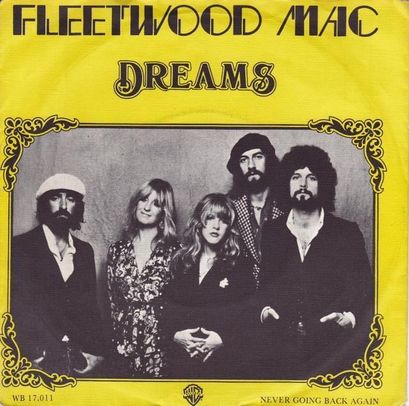
Stevie Nicks, the singer, songwriter, and producer. She is known mainly for her work on Fleetwood Mac, one of the most successful bands of all time. She is the first woman to be inducted twice into the Rock and Roll Hall of Fame and is considered one of the 100 Greatest Songwriters of all time by Rolling Stone Magazine. This is all to say, she is a really successful figure in the Rock and Roll scene, and this is only more impressive when one realizes how hard it is to succeed in the music industry as a woman.
Nicks’ second album with Fleetwood Mac, Rumours, is one of the best selling albums of all time and is where her most well-known work comes from. On this iconic album, one of the most iconic songs is Dreams, the band’s only Number 1 hit in the United States in 1977, a song written entirely by Stevie Nicks. It was written during a turbulent time for the band, at the time 3 separate breakups were occurring in the band, including her own with Lindsay Buckingham. Buckingham made his own breakup song with Go Your Own Way, but this song was written entirely from the perspective of Stevie Nicks.
And that may be the most important thing about this song. According to the publications of Dr Stacy L. Smith and her peers, only 12.3% of Songwriters of the last decade were women. The figures do not exist for the 70s, but we can logically assume due to discussions we are having today and how our attitude towards sexism has evolved, the numbers would be similar, if not worse. Especially for big classic rock bands, female songwriters were a rarity. That is why Stevie Nicks giving her side of the story matters so much. Was she successful? Well, her awards and recognition today should speak for themselves, but that does not tell the whole story. The most important thing about Stevie Nicks is what she had to say. And she had a lot to say. And Dreams coming at such a turbulent time in the band’s life meant she had a lot to say. The song is known as the magnum opus of the entire band, even more than Buckingham’s Go Your Own Way which was his side of the breakup. So what does she say with her side? Well.

Now here you go again, you say you want your freedom
Well, who am I to keep you down?
It’s only right that you should play the way you feel it
But listen carefully to the sound of your loneliness
Verse 1
This song was written almost directly to Lindsey Buckingham, as a response to their current breakup. It is easy to interpret from the first two lines alone, that this is the case. But as we also see, she is in control of this situation. She does not appear depressed over it or desperate for the man’s attention, instead, she has agency over the breakup just as much as the man does. She calls it his right to do so, but to also stay in touch with his emotions as he does so.
One might argue that another love song talking about a man is not progressive at all, however as noted by the New England Public Media in their video Challenging Female Stereotypes in Music, “…there are not a lot of variety of the ways in which women are portrayed in music, usually either in the background as kind of filler in videos, or there are specific tropes about being a strong woman or hypersexual.” Stevie Nicks is no background character in this song, she is the protagonist. And for her to take control of a song so powerfully gives her agency against an industry that tries to take it away from her.

Like a heartbeat drives you mad
In the stillness of remembering what you had
And what you lost
And what you had
Oh, what you lost
Pre-Chorus
Once again, Stevie Nicks takes the agency here. It is not her who lost something by not having a man around her, it is the man who lost her. Many breakup songs by women are framed as apologies. As stated in Hill, Mel Reiff, and Jay Mays’ The Gender Book, feminity is associated with: “Sensitive, mysterious, graceful, empathetic, caring, passionate, beautiful”, and it is true that Stevie Nicks does not abandon her traditionally feminine qualities, in particular, her mysteriousness and gracefulness defined her stage presence. But she notably shows decisiveness and toughness, something more associated with men, and uses it to give herself power.

Oh, thunder only happens when it’s raining
Players only love you when they’re playing
Say, women, they will come and they will go
When the rain washes you clean, you’ll know
Chorus
As Carol L. Thompson notes in her article Changing Gender Images in Rock and Roll: An Analysis of the Songs and Image of Stevie Nicks, “Nicks isn’t daunted, damaged or denied by losing her lover in this song. She emerges wiser and stronger.” And that is a fact, Stevie Nicks is saying “You may find other women, but at the end of the day, you will never find another one like me, I am a one in a kind individual.” And that establishing of individuality is so important because women were so far in music, even now, typically only used as sex objects in the background of videos. Stevie Nicks is saying that she will not be relegated to that, and she is in control of everything here.

Now here I go again, I see the crystal visions
I keep my visions to myself
It’s only me who wants to wrap around your dreams
And have you any dreams you’d like to sell?
Dreams of loneliness
Verse 2
In this verse, we see the bitterness, but also somberness behind Nick’s words. She is mad that Buckingham is selling their lifelong dreams together for short-term success, as expressed when she sings about selling dreams. But we also see her vulnerability in her words. She wants to wrap around his dreams, be a part of him, but she knows it is not going to work. Some might interpret this vulnerability as regressive, saying that she doubles down and admits that she does want to be with a man. But in reality, she shows her strength by displaying her vulnerability as she makes the decision to move on. She does have feelings, of course, she does, she is still human. But she is still making the ultimate choice to go her own way, independent from her once boyfriend, despite the feelings she may have, and that is true strength.

As Nadja Lovadinov says in her Epigram article Inspirational Woman: Stevie Nicks as she quotes Nicks herself, “Nicks is a bewitching beacon for young women who preaches freedom ‘I am a totally free woman, and I am independent, and that’s exactly what I always wanted to be.” It is not just her number of sales or awards, but who she is as a person who is so powerful. In one song she shows power, grace, and independence, while not being afraid to show vulnerability. She is the ultimate feminist songwriter, not only standing toe to toe with the many men in the industry but above them. That is why her presence is so incredible, and why even today, the ripples she made across all of the music industry can still be felt.
Works Cited
Smith, S. L., et al. (2019). Inclusion in the Recording Studio? Gender and Race/Ethnicity of Artists, Songwriters, and Producers Across 700 Popular Songs from 2012 – 2018. Publication of USC Annenberg Inclusion Initiative. Retrieved from http://assets.uscannenberg.org/docs/aii-inclusion-recording-studio-2019.pdf
New England Public Media. (2019, March 14). Challenging Female Stereotypes in Music 10:46 min. Retrieved fromhttps://youtu.be/IYct8ZLySzI
Hill, Mel Reiff and Jay Mays. The Gender Book. Marshall House Press, 2013. https://thegenderbook.com
Carol L. Thompson – Changing Gender Images in Rock and Roll: An Analysis of the Songs and Image of Stevie Nicks: http://ac-journal.org/journal/vol2/Iss1/essays/thompson.htm
Nadja Lovadinov. Inspirational Women: Stevie Nicks. (2021) – https://epigram.org.uk/2021/03/08/inspirational-woman-stevie-nicks/